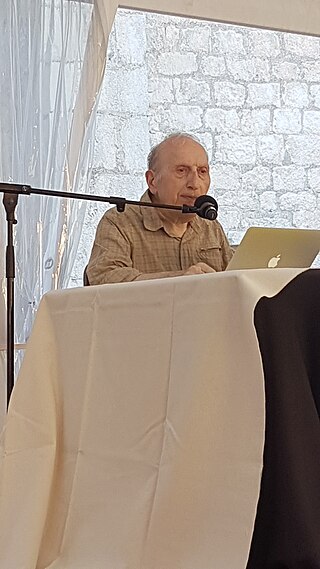
Michel Serres was a French philosopher, theorist and writer. His works explore themes of science, time and death, and later incorporated prose.

"Shihāb ad-Dīn" Yahya ibn Habash Suhrawardī (1154–1191) was a philosopher and founder of the Iranian school of Illuminationism, an important school in Islamic philosophy. The "light" in his "Philosophy of Illumination" is the source of knowledge. He is referred to by the honorific title Shaikh al-ʿIshraq "Master of Illumination" and Shaikh al-Maqtul "the Murdered Master", in reference to his execution for heresy. Mulla Sadra, the Persian sage of the Safavid era described Suhrawardi as the "Reviver of the Traces of the Pahlavi (Iranian) Sages", and Suhrawardi, in his magnum opus "The Philosophy of Illumination", thought of himself as a reviver or resuscitator of the ancient tradition of Persian wisdom. Suhrawardi provided a new Platonic critique of the peripatetic school of Avicenna that was dominant at his times, and that critique involved the fields of Logic, Physics, Epistemology, Psychology, and Metaphysics.

Ṣadr ad-Dīn Muḥammad Shīrāzī, more commonly known as Mullā Ṣadrā, was a Persian Twelver Shi'i Islamic mystic, philosopher, theologian, and ‘Ālim who led the Iranian cultural renaissance in the 17th century. According to Oliver Leaman, Mulla Sadra is arguably the single most important and influential philosopher in the Muslim world in the last four hundred years.

Michel Henry was a French philosopher, phenomenologist and novelist. He wrote five novels and numerous philosophical works. He also lectured at universities in France, Belgium, the United States, and Japan.
Henry Corbin was a French philosopher, theologian, and Iranologist, professor of Islamic studies at the École pratique des hautes études. He was influential in extending the modern study of traditional Islamic philosophy from early falsafa to later and "mystical" figures such as Suhrawardi, Ibn Arabi, and Mulla Sadra Shirazi. With works such as Histoire de la philosophie islamique (1964), he challenged the common European view that philosophy in the Islamic world declined after Averroes and Avicenna.
Jean-Paul Aron was a French writer, philosopher and journalist. His most notable work is Les Modernes, which was published in 1984.

Jean-Luc Marion is a French philosopher and Roman Catholic theologian. Marion is a former student of Jacques Derrida whose work is informed by patristic and mystical theology, phenomenology, and modern philosophy. Much of his academic work has dealt with Descartes and phenomenologists like Martin Heidegger and Edmund Husserl, but also religion. God Without Being, for example, is concerned predominantly with an analysis of idolatry, a theme strongly linked in Marion's work with love and the gift, which is a concept also explored at length by Derrida.

Jacques Bouveresse was a French philosopher who wrote on subjects including Ludwig Wittgenstein, Robert Musil, Karl Kraus, philosophy of science, epistemology, philosophy of mathematics and analytical philosophy. Bouveresse was called "an avis rara among the better known French philosophers in his championing of critical standards of thought."

Shmuel Trigano is a sociologist, philosopher, professor emeritus of sociology at Paris Nanterre University. He was Tikvah Fund Visiting Professor in Jewish Law and Thought at Benjamin N. Cardozo School of Law, New York (2009), and Templeton Fellow at the Herzl Institute (Jerusalem) program "Philosophy of the Tanakh, Midrash and Talmud" (2012-2013), (2015-2017). Elia Benamozegh European Chair of Sephardic Studies, Livorno, Italy (2002).
Gilles Grelet is a French theorist and former student of the French philosopher François Laruelle. He is the author of books and pamphlets which develop the main tenets of Laruellean non-philosophy. Following years of teaching, he lives as a sailor.

Catherine Clément is a French philosopher, novelist, feminist, and literary critic, born in Boulogne-Billancourt. She received a degree in philosophy from the École Normale Supérieure, and studied under its faculty Claude Lévi-Strauss and Jacques Lacan, working in the fields of anthropology and psychoanalysis. A member of the school of French feminism and écriture féminine, she has published books with Hélène Cixous and Julia Kristeva.

Jean-Claude Milner is a linguist, philosopher and essayist. His specialist fields of endeavour are linguistics and psychoanalysis. In 1971, Milner was at the Massachusetts Institute of Technology where he translated Noam Chomsky's Aspects of the Theory of Syntax into French. His work helped to establish the terminology of theory of syntax in the French school of generative grammar. Milner is now a professor at the University Paris Diderot and lives in Paris.
François Regnault is a French philosopher, playwright and dramaturg. Also a university instructor and teacher, Regnault was maître de conférences at Paris VIII before his retirement. Among his various writings he is the author, with Jean-Claude Milner, of the seminal Dire le vers and of Conférences d'esthétique lacanienne.

Robert Misrahi was a French philosopher who specialised in the work of 17th Century Dutch thinker Baruch Spinoza.

Ruwen Ogien was a contemporary French philosopher. He was a researcher at the French National Centre for Scientific Research. He focused on moral philosophy and the philosophy of social science. He was the brother of Albert Ogien a sociologist.

Lucien Jerphagnon was a French scholar, historian and philosopher specialized in Greek and Roman philosophy.
Seddiqin Argument or the argument of the righteous is an argument for the existence of God in Islamic philosophy. This argument was explained by Islamic philosophers such as Avicenna, Mulla Sadra and Muhammad Husayn Tabataba'i.
The grand prix de la Critique littéraire was created in 1948 by Robert André. It is awarded each year by the French PEN club to a literary essay. Chaired by Joël Schmidt, its jury is now made up of Jean Blot, Jean-Luc Despax, Jean-Claude Lamy, Daniel Leuwers, Jean Orizet, Laurence Paton, Antoine Spire and Patrick Tudoret. Since its creation, it has rewarded many leading authors and intends to promote a literary criticism of quality and, quite simply, literature.
Mohammad Ali Amir-Moezzi is an Islamologist at the École pratique des Hautes Études. He is one of the leading academics within the study of early Twelver Shiʿism.
Leili Echghi is an Iranian sociologist. She is known for her works on Iranian revolution.











